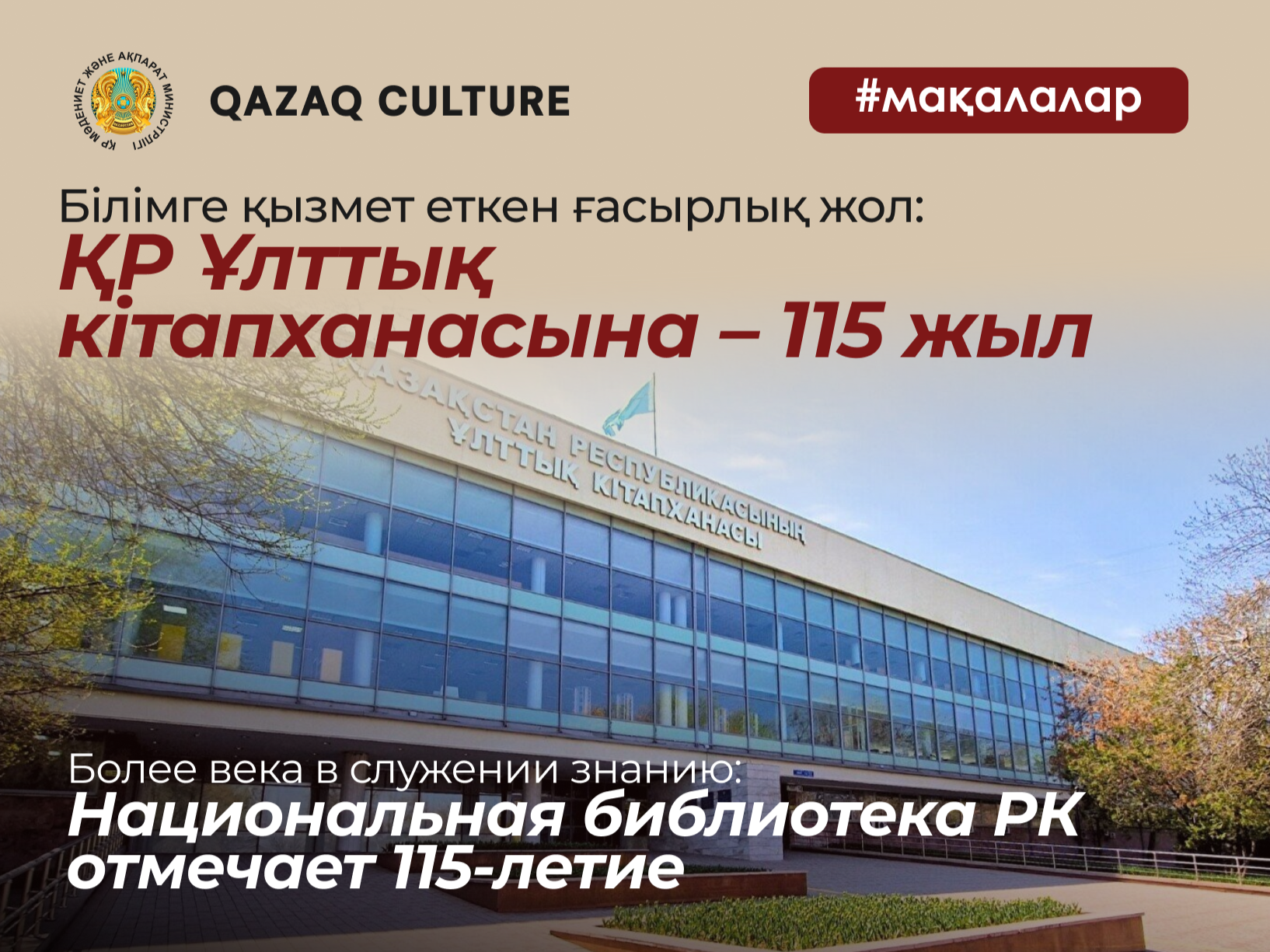More than a Century in the Service of Knowledge: The National Library of the Republic of Kazakhstan Celebrates its 115th Anniversary

In the era of digitalization, when information becomes fleeting, libraries are once again gaining strategic importance — as spaces of collective memory and cultural identity. The National Library of Kazakhstan is a vivid example of how a cultural institution can not only preserve the past but also shape the future.
It is not an archive of silence, but a living intellectual organism where tradition meets innovation, and knowledge merges with inspiration. Reflecting the evolution of the nation, the library has transformed into an institution of meaning — one that influences the country’s cultural self-awareness and its image on the international stage.
This year, the library marks its 115th anniversary — a milestone that goes far beyond a mere formal date. The story of the library is a journey through eras and ideologies, mirroring the development of the nation itself.
Founded in 1910 as the Verny Public Reading Room, it became a center of public enlightenment. In 1931, it was granted the status of the State Public Library of the Kazakh ASSR, fulfilling the role of the national depository. After Kazakhstan gained independence in 1991, the institution was officially named the National Library, and in 2020, this status was reaffirmed by Presidential decree.
Today, its collections hold more than 7 million items in 122 languages of the world — from ancient manuscripts to digital databases. It is the largest repository of knowledge in Central Asia and a unique bridge between national and global culture.
The Rare Books and Manuscripts Collection is the heart of the library. Over 40,000 unique items open a window into the history of thought and faith, science and poetry.
Among them are Kazakhstan’s oldest Quran written in Kufic script from the 12th century, the genealogy of Khoja Ahmed Yasawi’s lineage Nasabnama, and the exceptionally rare manuscript Hikmet Hazret Sultan al-Garifin by Suleiman Bakirgani — the only complete version of Bakyrgan Kitaby preserved to this day.
Alongside these are the works of great Eastern thinkers, including manuscripts of Alisher Navoi, translations of Ferdowsi’s Shahnameh into Old Turkic, and European editions from the 16th–17th centuries — from Galileo Galilei’s Dialogue Concerning the Two Chief World Systems to Erasmus of Rotterdam’s The Praise of Folly.
This synthesis makes the library a unique archive of civilizations, where East and West coexist in a single cultural context.
One of the central directions of the library’s work is the Kazakhstanika collection — a documentary portrait of the nation. It contains first editions of works by Abai, Altynsarin, Valikhanov, Dulatov, Bokeikhanov, and other thinkers whose ideas laid the foundation of Kazakh philosophical tradition.
These publications, along with newspapers such as Qazaq, Aiqap, Enbekshi Qazaq, and journals like Abai and Sholpan, capture the process of shaping national consciousness. They are not merely historical documents, but sociocultural markers of an era — revealing how the identity of the people was forged through language, literature, and public thought.
As noted by the Director of the National Library, Gaziza Nurgaliyeva, the library’s collections trace the entire path of Kazakh literature — from heroic epics to modern philosophical prose. If oral poetry once conveyed the spirit of the steppe, then the literature of the 20th–21st centuries has become an intellectual bridge between Kazakhstan and the world.
The writings of Abai, Auezov, Yessenberlin, and Valikhanov represent the cultural code of the nation’s consciousness, expressed through universal categories of goodness, reason, and destiny.
Researchers emphasize that works such as The Book of Words and the epic The Path of Abai portray Kazakhstan as a country with a profound humanistic philosophy, capable of speaking about eternal themes — morality, freedom, and the search for meaning.
Modern Kazakh authors are increasingly entering the global cultural space. The works of Dulat Isabekov, Rollan Seysenbayev, Aigul Kemelbayeva, Bakhytgul Sarmekova, and others are being translated into foreign languages and featured at literary festivals across Europe and Asia.
According to experts, this is no longer just a literary process but a new form of soft power — cultural diplomacy, where the written word becomes an instrument of mutual understanding.
The National Library, in turn, serves as a platform for this dialogue — promoting translations, international cooperation, and the preservation of national content within the global cultural circulation.
It is worth noting that 115 years is not only a testament to a long history but also proof of the ability to evolve. Today, the National Library is a center of innovation in the humanities, where digitalization meets tradition and knowledge becomes an open resource.
Experts note that the true value of the library lies not only in its collections but also in its power to inspire and educate generations.
Everyone who opens a rare manuscript or an early printed book becomes part of a living dialogue with history — a dialogue that has lasted for more than a century and continues to gain new resonance within the global cultural landscape.